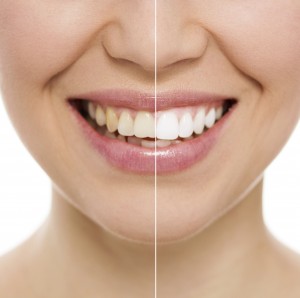 We regularly get patients who want to whiten their teeth.
We regularly get patients who want to whiten their teeth.
Coming in at different ages and stages of their lives, the yellow of their teeth has much to do with how well they’ve taken care of their teeth over time.
A common question we are asked is “what causes yellow teeth?”. Here is a quick summary to help you understand.
Your teeth naturally have a layer of protection called enamel. Enamel is white and therefore younger people tend to have whiter teeth. Enamel cannot be replaced once it is gone, so it needs to be protected.
Unfortunately, for some, due to their diets and oral health practices, the enamel deteriorates over time. Under the enamel is a yellow layer called dentin, and as more of the enamel disappears, the dentin shows through, hence the yellow teeth.
Commonly you’ll see that senior adults have a deeper color of yellow teeth.
What Causes Enamel to Deteriorate?
Certain foods and drinks will eat away at the enamel on your teeth, especially if they are not washed off after you’ve eaten. Here are some of the culprits you should be on the look out for.
Acid– The acid in sodas eats away at the enamel quickly. While it is wise to avoid sodas for oral health, for those who can’t give up soda, they can take the time to make sure it isn’t left in the mouth any longer than necessary.
Sugar– The sugar in candy, baked goods and other foods is also bad for your enamel. Not only can it eat at the enamel, but some sugary foods also stain the teeth with the coloring in them.
High Color Foods– Foods that have a lot of color can stain your teeth, changing the appearance of the enamel. Even fruits such as different berries are highly colorful and can stain, it’s always a good idea to brush after consuming them.
The Biggest Factor That Causes Yellow Teeth
Even with a diet that contains staining or acidic foods, the biggest problem we’ve seen is a lack of taking care of one’s teeth. Here is what we recommend our patients do to keep their smiles healthy.
Brush Often– No need to stop at twice a day. It is important to brush after each meal. In fact, it is wise to brush after each time we eat, but when that isn’t practical, rinsing the mouth out with water can help.
Whenever we eat, food becomes stuck between teeth and in the several hours it is left there, it can affect the enamel.
Drink Water– Water does not damage teeth. If you can avoid other drinks through out the day, and only drink water, you won’t have to worry about staining from coffee, soda, and juice. However, if you must drink those things, it can be helpful to rinse with water afterwards.
Every Time Matters– Since it takes years (in most cases) for enamel to deteriorate, people tend to believe that simply skipping on brushing here and there won’t make a difference.
We try to remind our patients, and all others, that each time you skip brushing, don’t rinse after a drink, or do not floss, you are in fact contributing to an unhealthy smile, and possibly causing your teeth to yellow faster.
Treatments for Yellow Teeth
For those who already have yellow teeth, we do offer a variety of healthy teeth whitening options in our office. We do caution against using self-whitening products as they often work against oral health, by bleaching or breaking down the tooth, leaving it compromised.
We do offer free consultations for anyone interested in learning more about healthy teeth whitening options. Please call our office to set one up today.
